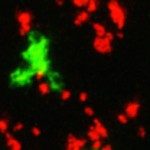Link to Pubmed [PMID] – 17617598
J. Immunol. 2007 Jul;179(2):1058-67
Activation of CD4(+) T cells helps establish and sustain CD8(+) T cell responses and is required for the effective clearance of acute infection. CD4-deficient mice are unable to control persistent infection and CD4(+) T cells are usually defective in chronic and persistent infections. We investigated the question of how persistent infection impacted pre-existing lymphocytic choriomeningitis virus (LCMV)-specific CD4(+) T cell responses. We identified class II-restricted epitopes from the entire set of open reading frames from LCMV Armstrong in BALB/c mice (H-2(d)) acutely infected with LCMV Armstrong. Of nine epitopes identified, six were restricted by I-A(d), one by I-E(d) and two were dually restricted by both I-A(d) and I-E(d) molecules. Additional experiments revealed that CD4(+) T cell responses specific for these epitopes were not generated following infection with the immunosuppressive clone 13 strain of LCMV. Most importantly, in peptide-immunized mice, established CD4(+) T cell responses to these LCMV CD4 epitopes as well as nonviral, OVA-specific responses were actively suppressed following infection with LCMV clone 13 and were undetectable within 12 days after infection, suggesting an active inhibition of established helper responses. To address this dysfunction, we performed transfer experiments using both the Smarta and OT-II systems. OT-II cells were not detected after clone 13 infection, indicating physical deletion, while Smarta cells proliferated but were unable to produce IFN-gamma, suggesting impairment of the production of this cytokine. Thus, multiple mechanisms may be involved in the impairment of helper responses in the setting of early persistent infection.

